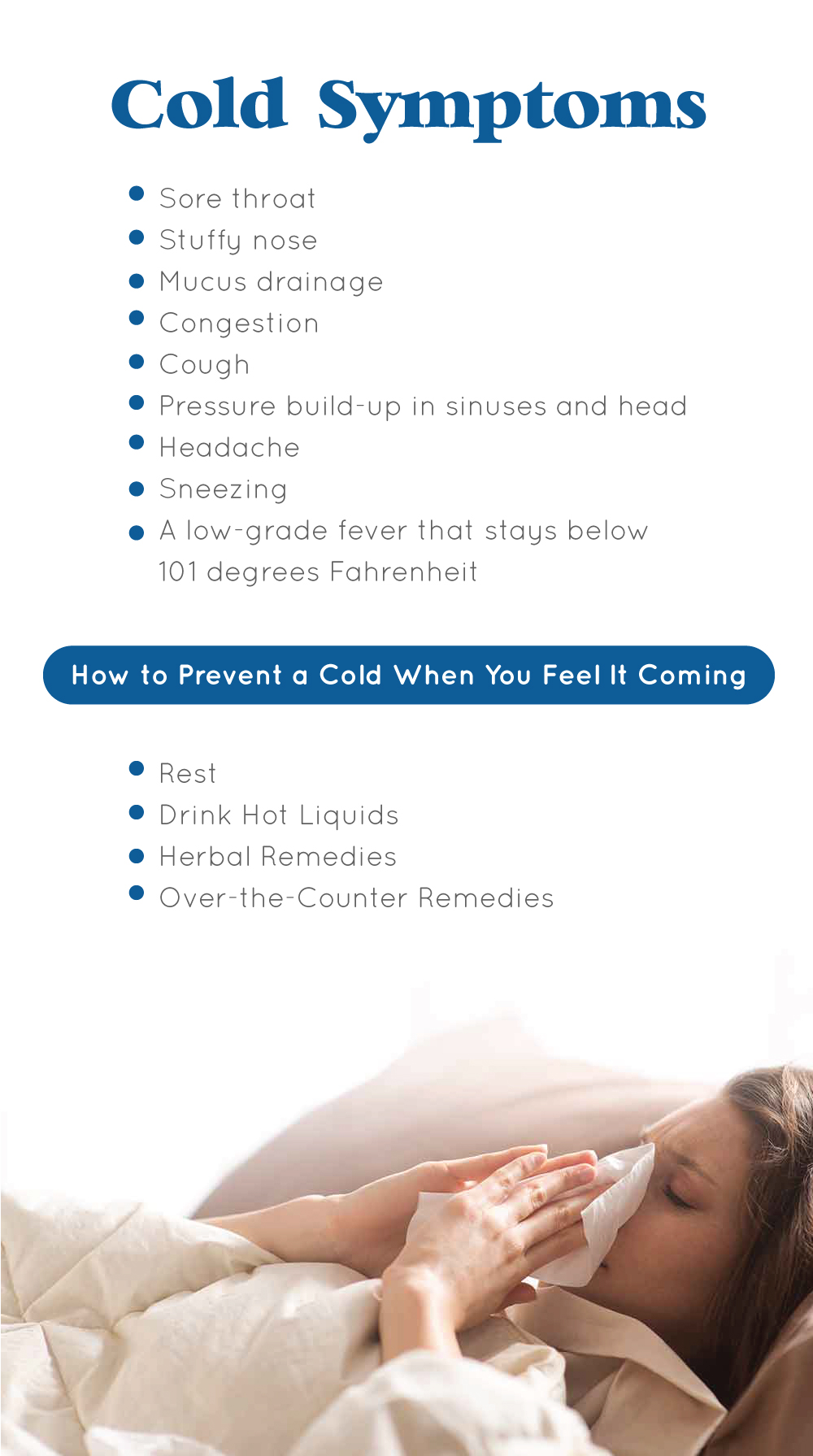We all know the drill – scratchy throat, a cough that feels impossible to suppress, a throbbing headache, and a perpetually runny nose. This perfect storm of symptoms usually points to the common cold. Most of us get the common cold at least once per year, sometimes twice or even three times. Having a cold can make normal functioning much more difficult than usual, and if you’re already fighting another illness, a cold just makes everything worse.
So, is there any way to prevent a cold? If you know that you will be exposed to the cold virus, or at least in crowded areas where you could easily be exposed, there are helpful steps you can take to prevent a full-blown cold. Here we go over helpful tips and cold prevention strategies to help you feel your best throughout the season.
What Is the Common Cold?
The common cold is caused by a virus that enters the body through our air passages – the nose and the mouth. Once a virus has entered the respiratory tract, the cells in your sinuses, nose, and throat become the host. The viral particles invade healthy cells, taking over and making themselves at home. Viruses spread from one cell to another, because they change your healthy cells DNA to look like their genetic code. Under normal circumstances, your cells divide and produce more healthy cells. If a cold virus is present, your cells divide and multiply viral DNA, instead of your own DNA. This process is underway during a time called the incubation period. Once the virus has reached enough cells, you will begin to exhibit full-blown symptoms of a cold.
Cold symptoms include:
- Sore throat
- Stuffy nose
- Mucus drainage
- Congestion
- Cough
- Pressure build-up in sinuses and head
- Headache
- Sneezing
- A low-grade fever that stays below 101 degrees Fahrenheit
Keep in mind that different viruses will result in variations in symptoms. Some common colds may be milder than others. Some may just affect your sinuses, without a cough, while others produce chest-focused symptoms and congested cough.
The highest risk of catching a cold coincides with flu season. Though the common cold can strike at any time of the year, it is most prevalent during seasons with cooler temperatures. Generally, this is because winter temperatures result in a dry atmosphere that allows viruses to more readily travel through the air, unimpeded by any other particles. In contrast, in humid summer weather, water particles present in the air significantly slow down the airborne viruses and prevent the spread from person to person.
Complications
We all know those colds that seem to drag on forever; weeks have gone by and there’s no end in sight. Your congestion is still worse than ever, and the cough is lingering long past what you had anticipated. You start to feel like being bogged down with the common cold is your “new normal.” In some cases, the perpetual mucus build up in your sinuses and throat creates the perfect habitat and breeding ground for another microorganism: bacteria. The last thing you need, on top of a relentless cold, is a bacterial infection.
This is why it’s critical to crack down on a cold virus before it has a chance to take hold and cause a full-blown infection.
Why Can’t We Vaccinate for the Common Cold?
Though it would be really convenient if there were a common cold vaccine, cold prevention is not quite as fool-proof as the vaccine for the flu.
We can predict the viral strains of the flu and load up vaccines with the inactive version of the flu. When we get our yearly flu shot, a certain amount of this inactive virus is injected into muscle tissue or skin tissue in the arm. The body immediately launches an investigation of the foreign material, noting the virus’s genetic code and producing antibodies that can immediately target this particular viral invader. Because the virus is inactive, we don’t need to worry about an ensuing infection, leaving our immune system prepped but not exhausted. As a result, when an active virus with the same genetic code attempts to enter the body a second time, the immune system will immediately recognize it and prevent infection.
Why do we need to get flu shots every year? Because the flu viruses change and adapt at a rate that requires us to produce updated flu shots on a yearly basis. Last year’s flu shot wouldn’t be able to protect you against this year’s flu strains since the genetic codes have changed.
The ability of viruses to mutate is the underlying explanation for why we can’t prevent the common cold with a vaccine.
Unfortunately, the concept behind the flu vaccine cannot be applied to common cold prevention. In a way, you can think of the common cold virus as being more “intelligent” than the flu virus. This is because the viral strains for the common cold are highly adaptable. As the cold virus spreads throughout the population, it is constantly and rapidly mutating, which prevents us from knowing its genetic code long enough to produce viable vaccines. In addition, there are so many strains of viruses that cause the common cold, it would be impossible for researchers and clinicians to keep enough updated vaccines on hand to make a difference.
By the time we manufacture a vaccine for one strain of the common cold virus, the shot will most likely be irrelevant as the strain will have already mutated. Not to mention, hundreds of other strains would continue to be passed from person to person.
First Line of Defense: Physical Barriers
The first step is preventing the virus from getting to your airways in the first place. If you are in a crowded or public place, you are likely being exposed to surfaces that may carry a virus. Avoid touching objects like doorknobs and faucets and then touching your mouth, nose, or face. Additionally, it’s helpful to be diligent about washing your hands with soap and warm water before eating.
Let’s go over the best way to wash your hands since a quick rinse under cold water won’t quite do the trick. To make sure your hands are sufficiently cleaned, lather with soap and a little bit of water. While lathering, sing the alphabet song in your head (or out loud) three times through, at a moderate pace. Make sure to clean in between your fingers, and take turns scratching your palms as microorganisms can dwell and accumulate underneath your fingernails. Keep in mind that antibacterial soap is not necessarily more effective than regular soap since bacteria are different microorganisms than viruses. If you don’t have access to soap and water, hand sanitizer will do just fine.
The common cold virus is particularly skilled at traveling through the air. When someone sneezes or coughs, a mist of airborne particles will spray into the air. Though invisible, it is easy for those nearby to breathe in the virus, allowing it to reach their mouths, throat, and nose. Keeping a distance from others when they are coughing or sneezing will reduce the likelihood of welcoming viruses into your body via breathing.
If you are immunosuppressed or susceptible to contracting the common cold as a result of other conditions, it may be advisable to wear a medically acceptable mask in public or crowded spaces. Though you will still be able to breathe normally, the mask will filter out viral particles that may be present in the air.
Second Line of Defense: Fortifying Your Immune System to Prevent Infection
Even if you take the utmost precaution with handwashing, chances are that the common cold virus will find a way to enter your body. For example, if you’re on an airplane and someone with a cold sneezes or coughs in your vicinity, the virus doesn’t have anywhere to go and is contained within the recycled air.
At this point, your immune health is the key deciding factor that will determine whether you contract the cold or fight it off without symptoms. The latter is by far more desirable; let’s look at ways to make sure your immune system is as strong as it can possibly be, so you don’t need to deal with a pesky and inconvenient cold.
When the cold virus enters your body, the first immune response triggered is called the innate immune response. This is essentially an immediate response that alerts your immune system to a foreign invader as it attempts to quarantine the viral attackers, so that surrounding cells can be spared of a spreading infection.
Supporting this innate immune response will be the key to fighting off a cold virus during the incubation period. If your immune system is in top shape, you will likely ward off the invading virus being completely unaware that you were ever at risk of contracting a cold. These suggestions address ways to strengthen your baseline immune function, so viruses have a harder time catching you off guard.
Tips for Strengthening Your Immune System
1. Get Enough Sleep
When we sleep, our body is hard at work clearing debris, smoothing out cellular processes, and repairing any cellular damage from the day’s normal activities as well as exposure to any environmental toxins or pathogens, including the cold virus.
Reflect on how it feels to be sleep deprived: scattered, exhausted, not quite able to keep up with tasks, and out of energy. This feeling mirrors our immune system function during times of inadequate rest.
When we get enough sleep, we feel better and more able to cope with day-to-day stressors, both mentally and physically. And, your immune response is more streamlined and efficient in handling foreign invaders. Getting even one good night’s sleep will do wonders to support your immune system as it fights off the cold virus.
2. Drink Enough Fluids
Drinking plenty of water is critical for keeping your cellular processes operating at optimal levels. Our cells are mostly comprised of water, so we need to ensure that we drink enough water to support the body. Drinking plenty of fluid helps cells flush out waste and viral particles that cause the common cold.
3. Stretch
Stretching and incorporating movement into your daily routine helps to keep your lymphatic system moving. Your lymphatic system eliminates waste from the immune system so that it can do its job more effectively.
4. Avoid Alcohol
Alcohol interferes with healthy immune system function. Even drinking a few alcoholic beverages in one night suppresses your immune activity, leaving you susceptible to developing the common cold if you’ve been exposed to the virus. Moreover, alcohol consumption causes oxidative stress, which means that free radicals build up in your cells and tissues. Free radicals are reactive particles that can damage cells and impede healthy functioning.
5. Eat a Balanced Diet
A balanced diet rich in vitamins, nutrients, protein, and anti-inflammatory and antioxidant agents supports your immune system and optimizes cellular function. Consuming a diet based mainly on whole grains, vegetables, fruits, and legumes ensure that you are getting sufficient vitamins and antioxidants throughout the day. Antioxidants prevent oxidative stress and damage by neutralizing free radicals, which allows your immune system to fight foreign invaders without being bogged down by cellular waste.
The amino acids present in protein sources are also vital supporters of immune system function. Our bodies utilize amino acids to produce compounds crucial for immune response. There are nine essential amino acids that we must obtain from the foods we eat. Meat, dairy products, and soy products contain all nine essential amino acids at the optimal ratios we need to function. Consuming a variety of plant-based products can also provide sufficient levels of amino acids for healthy immune system function.
6. Exercise
Usually, we think exercise is key to lowering the risk of developing noncommunicable diseases like diabetes, high blood pressure, and fatty liver disease. It may seem counterintuitive that exercise may actually improve resilience to communicable diseases as well, including the flu or the common cold.
Research shows that engaging in regular exercise improves immune function by lowering inflammation and sending cells that play a role in innate immune response throughout the body. (1)
On the other hand, avoid engaging in overly strenuous exercise on a daily or almost daily basis. Excessively intensive weight training and aerobic exercise causes damage to your body. To repair the damage, your body requires resources from your immune system. This, in turn, diverts nutrients and energy from addressing an impending infection, making it more likely to contract a cold.
Stay in tune with your body, and if you’re feeling particularly exhausted or like you may be fighting a virus, lay off the exercise to give your body a chance to rest. When exercising, make sure you consume nutrient-dense foods, an adequate number of calories, and plenty of water.
7. Minimize Stress
Each day, we are faced with stressors that have the potential to activate our immune system. Interestingly, psychological stress can have repercussions that negatively impact our physical health. Whether you’re experiencing a traumatic event or chronic daily stressors, the stress response manifests physiologically as well as psychologically. Stress activates the sympathetic nervous system, increases adrenaline, and increases cortisol levels. Chronically stressful conditions can result in systemic inflammation that compromises your immune system. Incorporating daily meditation and yoga, maintaining a regular sleep schedule, and eating a healthy diet can all help manage stress.
8. Supplement When Needed
It is difficult to simultaneously hydrate, sleep enough, and eat well at all times. Life circumstances get in the way, and maybe the only food available is a cheeseburger or maybe you weren’t able to have a full night’s rest because you were stressed about a work deadline. This is when supplements come into play. If you’re considering supplementing, always consult your dietician and physician to make sure the supplements support your specific health needs and don’t interfere with any medications you may be taking.
Balance Is Key
As mentioned above, life’s demands and circumstances often preclude our ability to maintain ideal eating patterns, sleep habits, exercise routines, and stress levels. Luckily, the tips are designed to not only work in harmony with other tips but also to have protective mechanisms when you can’t quite do everything at one time. For example, if you go through a period of time when you’re having difficulty sleeping and are dealing with higher than usual amounts of stress, eating a balanced diet focused on whole foods will help compensate for inflammation and oxidative stress. It is advisable to do at least a few at one time since all tips work in concert.
Third Line of Defense: Fortifying Your Immune System to Ward Off Infection
If the common cold virus has made its way past both the first and second lines of defense, you are now looking for how to stop a cold when you feel it coming on. Your immune system is now assigned the more difficult task of ridding your body of a viral infection after it has attacked millions of cells. The immune response involved at this stage of a cold is called the adaptive immune response. During this process, your body manufactures T lymphocytes and B lymphocytes that specifically target the cold virus that has infected your cells.
How Long Does It Take to Catch a Cold?
If you’ve been exposed to the virus, viral particles will begin to accumulate and you may begin to feel preliminary symptoms about 12 hours after exposure. Symptoms typically peak two or three days after this, when the virus has multiplied even more.
How to Prevent a Cold When You Feel It Coming
Because of how quickly a cold virus can take hold, our best chances of stopping a cold before it starts depends on early detection. Stay vigilant and look out for these symptoms, which may sometimes seem subtle or easily attributable to other causes:
- Lethargy
- Slightly scratchy throat
- Feeling more run-down than usual
If you are experiencing these symptoms in combination with any of the following circumstances, the common cold is likely on the attack:
- More traveling than usual
- Close contact with an infected person
- Sleep deprivation
- Alcohol consumption
- Excessive exercise
Now is the time to take immediate action to ensure that your immune system is operating smoothly, so you have the biggest chance of warding off the virus and preventing a full-scale cold from taking hold. Strategies for how to stop a cold include:
1. Rest
Since your immune system has been compromised by the invasion of a cold virus, which is why you’re probably feeling lethargic and run down. It is important to rest and allow your body to channel its energy towards removing the virus from your body.
2. Drink Hot Liquids
Hot liquids, like tea and soup, help soothe a scratchy throat and flush out viral particles. Hot liquids also serve as mild decongestants by mobilizing mucus that accumulates in your sinus and nasal passages. This allows for relief from congestion, which may also help alleviate headaches associated with sinus pressure. Mucus contains high amounts of the cold virus and regularly removing this mucus will help prevent viral build-up and possible complications, like bacteria growth. Your immune system has an easier time clearing the cold if fewer viral particles are present.
3. Herbal Remedies
Vitamin C, zinc, and echinacea are the classic trio of cold-fighting supplements – because they work! This vitamin, mineral, and herb harmonize to strengthen immune system activity, so your body is more likely to fight off a virus before it develops into a cold.
4. Over-the-Counter Remedies
Though your symptoms may not be severe at this point, over-the-counter products can help manage any of the symptoms you do have and help you feel better while you’re fighting off the virus. Acetaminophen or ibuprofen may help soothe headaches and reduce low-grade fevers, decongestants can loosen mucus and relieve sinus pressure, and lozenges can help relieve a scratchy throat.
Conditions That May Affect Immunity
It’s important to keep in mind that underlying health conditions may compromise your ability to fight off a cold. Your immune system is influenced by your overall health, including liver function and metabolic health.
Your Immune System Is Tied to Liver Health
If your liver is not operating at full capacity, neither will your immune system. Your liver plays an important role in recognizing invading pathogens and contains many cells involved in immunity, like natural killer cells and macrophages. Hepatic conditions like fatty liver disease and liver cirrhosis result in molecular changes in the liver that leave your immune system less effective in launching innate immune responses. Additionally, liver damage can be a driver of systemic inflammation by increasing the release of cytokines. (2)
Immune Response Is Also Related To Metabolic Health
Metabolic syndrome encompasses conditions like type 2 diabetes, high cholesterol, and insulin resistance, and is associated with risk factors like obesity or a sedentary lifestyle. Metabolic health is highly connected to immune function. Conditions like high blood sugar and insulin dysfunction put added stress on the body that leads to chronic systemic inflammation. Being overweight also alters immune function by leading to the accumulation of fat cells in the lymphoid system. These fat deposits impact the normal immune response by increasing the levels of leukocytes in the body. As a result, the immune response becomes less efficient at targeting invading pathogens, such as viruses. (3)
Promoting metabolic health will ultimately lead to better immune function and a lower risk of contracting the common cold.
Better Liver Health and Metabolic Health Means a Healthier Immune System
If you are struggling with conditions like fatty liver disease or diabetes, your immune system may be less efficient at preventing the common cold. Talk with your doctor about how you can best handle these conditions to make sure they don’t compromise your immune system.
Diet and lifestyle changes can also help reverse fatty liver disease, improve your cholesterol, and increase insulin sensitivity.
Conclusion
No one enjoys a cold that causes unpleasant symptoms and interferes with your daily life. Luckily, there are ways to lower the risk of catching a cold. If you’ve tried all of the above tips and the cold has still managed to throttle up and fight back, it’s now important to focus your efforts towards shortening the duration of the cold so you can get back to feeling 100% as soon as possible.

References:
1.https://www.sciencedirect.com/science/article/pii/S2095254618301005























